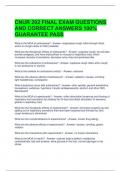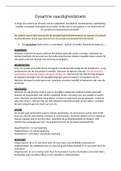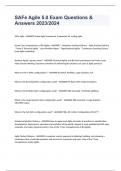CNUR 202 FINAL EXAM QUESTIONS
AND CORRECT ANSWERS 100%
GUARANTEE PASS
What is the MOA of antitussives? - Answer- suppresses cough reflex through direct
action on cough center in CNS (medulla)
What are the therapeutic effects of antitussives? - Answer- suppress cough, but will also
provide analgesia, and have drying effect on mucosa of respiratory tract, which
increases viscosity of secretions, decrease runny nose and postnasal drip
What are the indications of antitussives? - Answer- suppress cough reflex when cough
is non-productive or harmful
What is the antidote for antitussive toxicity? - Answer- naloxone
What are the adverse effects of antitussives? - Answer- sedation, nausea, vomiting,
light-headedness, constipation
What interactions occur with antitussives? - Answer- other opioids, general anesthetics,
tranquilizers, sedatives, hypnotics, tricyclic antidepressants, alcohol, and other CNS
depressants
What is the MOA of expectorants? - Answer- reflex stimulation loosening and thinning of
respiratory tract secretions by irritating the GI tract and direct stimulation of secretory
glands in respiratory tract
What are the therapeutic effects of expectorants? - Answer- promotes coughing up and
spitting out of respiratory secretions that have been loosened and thinned out, and
cough tendency is diminished
What are the contraindications of expectorants? - Answer- known drug allergy
What are the adverse effects of expectorants? - Answer- nausea, vomiting, gastric
irritation
What are the interactions with expectorants? - Answer- no known interactions
What is the MOA of insulin? - Answer- restores body's ability to metabolize
carbohydrates, fats and proteins, store glucose in the liver, convert glycogen to fat
stores
,What is rapid acting insulin? - Answer- treatment for types 1 and 2, most rapid onset of
action (10-15 min), lasts 3-5 hours, patient must eat meal after injection
What is short-acting insulin? - Answer- regular insulin, only insulin that can be given IV
or IM, onset is 30 mins, lasts 6.5 hours
What is the intermediate acting insulin? - Answer- NPH, cloudy appearance, often
combined with regular insulin, onset is 1-3 hrs, lasts up to 18 hours
What is long acting insulin? - Answer- lantus, clear, colourless solution, constant level of
insulin in the body, usually dosed once daily can be given Q12, onset 90 mins, duration
24 hrs
What is sliding-scale insulin dosing? - Answer- subcut rapid-acting or shot-acting
insulins are adjusted according to blood glucose test results, typically used for
hospitalized patients or those on total parenteral nutrition or enteral tube feedings,
ordered in an amount that increases as the blood glucose increases
What is basal-bolus insulin dosing? - Answer- Preferred method of treatment for
hospitalized DM pts
Mimics a healthy pancreas by delivering basal insulin (long acting) continuously as a
basal and then as needed as a bolus (regular)
What teaching is involved with insulin? - Answer- self-administration of insulin injections,
timing of doses, monitoring of blood glucose levels, injection site rotations, disease
process, diet and exercise recommendations, potential complications
What is the MOA of glucocorticoids? - Answer- indirectly effects modifying enzyme
activity, glucocorticoids differ in their potency, duration of action and the extent to which
they cause salt and fluid retention, inhibit or help control inflammatory and immune
responses, stimulate bone demineralization, promote breakdown of protein,
glycogenesis and fat redistribution, increase blood glucose levels
What are the indications for glucocorticoids? - Answer- adrenocortical deficiency as
replacement hormones, allergic disorder, cerebral edema, collagen diseases,
dermatological diseases, endocrine disorders, GI diseases, exacerbations of chronic
respiratory diseases, hematological disorders, cancer, inflammatory ophthalmic
disorders, organ transplantation, leukemias and lymphomas, nephrotic syndrome, spinal
cord injury, rheumatic disorders, thyroiditis
What are the contraindications of glucocorticoids? - Answer- known drug allergy,
cataracts, glaucoma, peptic ulcer disease, mental health problems, diabetes, avoided
with serious infection, including septicemia, systemic fungal infections and varicella, use
, cautiously in patients with gastritis, reflux disease, ulcer disease, diabetes, cardiac,
renal, or liver dysfunction
What are the adverse effects of glucocorticoids ? - Answer- CV: HF, cardiac edema,
HTN, impaired glucose tolerance, dysrhythmias, bradycardia, pulmonary edema,
syncope, vasculitis
CNS: convulsions, headache, vertigo, mood swings, nervousness, aggressive behavior,
pyschotic symptoms, insomnia, neuritis, peripheral neuropathy, paresthesia,
arachnoiditis, meningitis
Endo: growth suppression, Cushing's syndrome, menstrual irregularities, carbohydrate
intolerance, hyperglycemia, hypothalamic-pituitary-adrenal axis suppression, hirsutism,
hypertrichosis glycosuria
GI: peptic ulcers, pancreatitis, ulcerative esophagitis, abdominal distension
Skin: fragile skin, petechiae, ecchymosis, facial erythema, poor wound healing,
urticarial, hypersensitivity reactions, acne, dry skin, skin hyperpigmentation, skin striae
MSK: myopathy, muscle weakness, loss of muscle mass, osteoporosis, osteonecrosis
of femoral and humeral heads, pathological fracture, malaise
Ocular: increased ocular pressure, glaucoma, cataracts
Other: weight gain, leukocytosis, opportunistic infections, hypokalemia alkalosis,
impaired healing
What are sedatives? - Answer- inhibitory effect on the CNS to the degree that they
reduce: nervousness, excitability, irritability
What are hypnotics? - Answer- more potent effect on CNS than sedatives, cause sleep,
sedative can become hypnotic if given in large enough doses
What are the three main groups of depressants? - Answer- barbiturates,
benzodiazepines, and miscellaneous
What are benzodiazepines? - Answer- formerly the most common prescribed sedative-
hypnotic drug, nonbenzodiazepines currently more frequently prescribed, favourable
adverse effect profiles, efficacy and safety, classified as either sedative-hypnotic or
anxiolytic
What is the MOA for benzodiazepines? - Answer- depress CNS activity, affect
hypothalamic, thalamic and limbic systems of the brain
What are the indications for benzodiazepines? - Answer- sedation, sleep induction,
skeletal muscle relaxation, agitation or anxiety relief, anxiety-related depression, acute
seizure disorders, alcohol withdrawal treatment, short-term therapy for insomnia,
anesthesia, procedural sedation
What are the contraindications of benzodiazepines? - Answer- known drug allergy,
narrow-angle glaucoma, pregnancy






